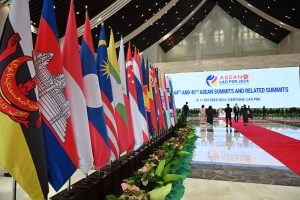Never mind giving a man a fishing rod; give a journalist an opinion survey and they’ll churn out more copy than a Russian chatbot. Maybe not, though, with the latest annual “State of Southeast Asia” survey report, which was published last Friday.
Last year’s report had all the drama of a minor geopolitical thriller. For the first time, when asked, “If ASEAN were forced to align itself with one of its strategic rivals, which should it choose?” a narrow majority of Southeast Asian elites picked China over the United States. Cue global headlines and think pieces. This year, however, the report from the ISEAS-Yusof Ishak Institute brings us back to comforting normality: 52 percent chose the U.S., 48 percent China. (As a Brit, I get a little sweat when reading 52-48, the “ratio of the beast”.) Channel News Asia dutifully went with the headline, “U.S. regains edge over China as preferred partner in Southeast Asia: Survey.”
But there’s a significant catch that applies to the findings of this year’s State of Southeast Asia survey: it was conducted over six weeks, from January 3 to February 15 – meaning that just under half the respondents took it before Donald Trump’s re-inauguration, and all of them before his April 2 harbinger of globalization’s endtimes.
Does this render the results bunkum? Slightly, especially when the U.S. is mentioned, which is a lot, given that this is primarily a survey on foreign relations. Perhaps the 2025 report is best seen as a time capsule of those now halcyon days, an inter(trade)bellum when the U.S. could be both the champion and dismantler of free trade, a Schrodinger’s Cat of globalization. The lid of that particular box was very much ripped off by Trump last week, revealing the contents to the world.
You know you’re living through one of history’s revolutionary phases when the phrase status quo ante trickles off the tongue each week. One senses something of the pace of change from the fact that 19 percent of Southeast Asian respondents (and 37 percent from Vietnam) thought just a few weeks ago that the U.S. was the single greatest champion of global free trade. Annoyingly, when the pollsters posed the question “What could potentially worsen your positive impression of the United States?” they didn’t include the answer “tank the global economy” in the five stated options. However, for the question, “What can the United States do to improve relations with your country?” they did include the potential answer, “The U.S. should make bilateral trade truly mutually beneficial by addressing trade imbalances.” Badly phrased, I grant, since one might argue that Trump’s tariffs were about addressing trade imbalances, so perhaps it is best to assume that the 19 percent of Southeast Asians who agreed that this rebalance meant that if the U.S. improved trade relations. Also, some 43 percent said they were worried about America’s growing economic influence in the region; presumably, their fears have now been confirmed.
And yet: highlights! Bright spots! What can we take from this survey? Quite a bit from the question, “Which of the following current geopolitical events are the top concerns for the government in your country?” Allowed three choices, only 31 percent of Southeast Asians thought the ongoing Myanmar conflict was a top-three concern, a ringing endorsement of just how little the rest of the region is concerned about an actual civil war in its midst. Interestingly enough, more people (37 percent) thought that the Israel-Hamas war was a greater concern for Southeast Asian governments! Interestingly, too, concern about Gaza slid from 47 percent in last year’s survey.
Just as intriguing is the rise of cyberscamming into the top three regional concerns. Thirty-nine percent flagged it last year; this year, it’s up to nearly half. In fact, it was listed as the region’s top concern by Thais and Laotians, while Cambodians and Filipinos ranked it as the region’s second top priority.
What about a feel-good stat? Some 91 percent of Southeast Asian elites reckoned that “a democratic political system (characterized by free, fair, and frequent elections, an independent and pluralistic media, and freedom of association and opinion, among others) to be the best form of governance for your country and the region.” It’s a shame the survey didn’t follow up with “And do you think your country currently has that?” but there you go. At the same time, 17 percent of Vietnamese and 24 percent of Bruneians went full honesty mode and said no thanks to democracy. The most liberty-loving people? Indonesians, Burmese, and Cambodians.

































